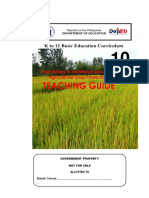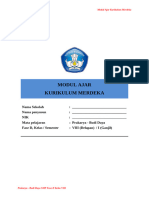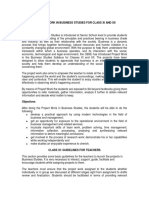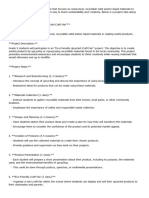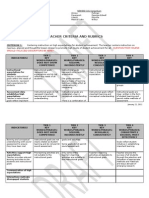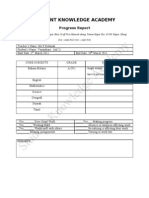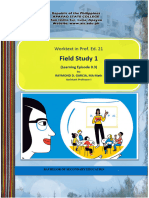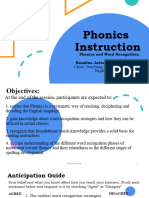0 ratings0% found this document useful (0 votes)
32 viewsBudidaya Tanaman Hias
Budidaya Tanaman Hias
Uploaded by
Muhammad Syafi'i Putra SulungThis lesson plan aims to teach Indonesian vocational high school students about the agribusiness of ornamental plants. It includes 4 learning objectives: understanding the importance of ornamental plant agribusiness in Indonesia, identifying common ornamental plant types grown in Indonesia, analyzing the market potential and demand for ornamental plants, and developing basic cultivation and management skills. The lesson consists of introductory activities, a plant identification mini-exhibition, market research in small groups, a demonstration of cultivation techniques, and a culminating ornamental plant showcase event. Formative and summative assessments are integrated throughout the lesson.
Copyright:
© All Rights Reserved
Available Formats
Download as PDF, TXT or read online from Scribd
Budidaya Tanaman Hias
Budidaya Tanaman Hias
Uploaded by
Muhammad Syafi'i Putra Sulung0 ratings0% found this document useful (0 votes)
32 views4 pagesThis lesson plan aims to teach Indonesian vocational high school students about the agribusiness of ornamental plants. It includes 4 learning objectives: understanding the importance of ornamental plant agribusiness in Indonesia, identifying common ornamental plant types grown in Indonesia, analyzing the market potential and demand for ornamental plants, and developing basic cultivation and management skills. The lesson consists of introductory activities, a plant identification mini-exhibition, market research in small groups, a demonstration of cultivation techniques, and a culminating ornamental plant showcase event. Formative and summative assessments are integrated throughout the lesson.
Original Description:
materi budidaya tanaman hias
Original Title
budidaya tanaman hias
Copyright
© © All Rights Reserved
Available Formats
PDF, TXT or read online from Scribd
Share this document
Did you find this document useful?
Is this content inappropriate?
This lesson plan aims to teach Indonesian vocational high school students about the agribusiness of ornamental plants. It includes 4 learning objectives: understanding the importance of ornamental plant agribusiness in Indonesia, identifying common ornamental plant types grown in Indonesia, analyzing the market potential and demand for ornamental plants, and developing basic cultivation and management skills. The lesson consists of introductory activities, a plant identification mini-exhibition, market research in small groups, a demonstration of cultivation techniques, and a culminating ornamental plant showcase event. Formative and summative assessments are integrated throughout the lesson.
Copyright:
© All Rights Reserved
Available Formats
Download as PDF, TXT or read online from Scribd
Download as pdf or txt
0 ratings0% found this document useful (0 votes)
32 views4 pagesBudidaya Tanaman Hias
Budidaya Tanaman Hias
Uploaded by
Muhammad Syafi'i Putra SulungThis lesson plan aims to teach Indonesian vocational high school students about the agribusiness of ornamental plants. It includes 4 learning objectives: understanding the importance of ornamental plant agribusiness in Indonesia, identifying common ornamental plant types grown in Indonesia, analyzing the market potential and demand for ornamental plants, and developing basic cultivation and management skills. The lesson consists of introductory activities, a plant identification mini-exhibition, market research in small groups, a demonstration of cultivation techniques, and a culminating ornamental plant showcase event. Formative and summative assessments are integrated throughout the lesson.
Copyright:
© All Rights Reserved
Available Formats
Download as PDF, TXT or read online from Scribd
Download as pdf or txt
You are on page 1of 4
1/4
Lesson Plan Title
budidaya tanaman hias
Lesson Plan
Lesson Plan: Agribusiness of Ornamental Plants in Indonesia
Grade: SMK (Sekolah Menengah Kejuruan) Students - Kelas XII
Subject: Agribusiness of Ornamental Plants
Module: Agribusiness of Ornamental Plants in Indonesia
Learning Objectives:
1. Understand the importance of the agribusiness of ornamental plants in
Indonesia.
2. Identify different types of ornamental plants commonly grown in
Indonesia.
3. Analyze the market potential and demand for ornamental plants in
Indonesia.
4. Develop basic skills in cultivating and managing ornamental plants.
Standards:
Standard 1: Students will be able to explain the importance of
ornamental plants in the agribusiness sector.
Standard 2: Students will be able to identify different types of
ornamental plants commonly grown in Indonesia.
Generate another lesson plan! 07/09/2023
Standard 3: Students will be able to analyze the market potential and
demand for ornamental plants in Indonesia.
Standard 4: Students will be able to demonstrate basic skills in
cultivating and managing ornamental plants.
Procedure:
I. Introduction (10 minutes)
Begin the lesson by displaying pictures of beautiful ornamental plants
and ask students to describe their features.
Discuss the importance of ornamental plants in the agribusiness
industry, such as their role in landscaping, decoration, and export.
Connect the discussion to Standard 1 and emphasize the significance of
ornamental plant cultivation in Indonesia.
II. Types of Ornamental Plants in Indonesia (20 minutes)
Show pictures and provide information about different types of
ornamental plants commonly grown in Indonesia, such as orchids, roses,
bonsai trees, and ferns.
Engage students by organizing a mini-exhibition where they can observe
and appreciate live samples of various ornamental plants.
Ask students to identify the plants and share their observations.
Connect the activity to Standard 2 and ensure students can recognize
and differentiate between different types of ornamental plants.
III. Market Potential and Demand Analysis (30 minutes)
Divide students into small groups and assign each group a specific
ornamental plant.
Instruct the groups to research the market potential and demand for
Generate another lesson plan! 07/09/2023
their assigned plant, including its current market value, export potential,
and local demand.
Each group presents their findings to the class, followed by a discussion
on the overall market potential and demand for ornamental plants in
Indonesia.
Connect the activity to Standard 3 and encourage students to analyze the
market dynamics of ornamental plants in Indonesia.
IV. Cultivation and Management Skills (40 minutes)
Introduce basic cultivation techniques and management practices for
ornamental plants, such as soil preparation, watering, fertilization, and
pest control.
Demonstrate these techniques using live plants or visual aids.
Divide students into pairs and provide them with ornamental plant
seedlings or cuttings.
Instruct students to apply the techniques demonstrated and cultivate
their assigned plants.
Encourage students to document the growth and development of their
plants and share their experiences with the class.
Connect the activity to Standard 4 and assess students' ability to apply
cultivation and management skills effectively.
V. Culminating Activity: Ornamental Plant Showcase (20 minutes)
Organize a showcase event where students display their cultivated
ornamental plants.
Invite teachers, students from other classes, and parents to attend the
event.
Each student presents their plant, shares their cultivation journey, and
highlights the unique features of their plant.
Encourage attendees to ask questions and engage in discussions about
Generate another lesson plan! 07/09/2023
ornamental plants.
Evaluate students' presentation skills, knowledge about their plants, and
overall participation in the event.
Assessment:
Formative assessments can be conducted throughout the lesson through
class discussions, group presentations, and observations of students'
cultivation and management skills.
Summative assessments can include evaluating students' understanding
of the importance of ornamental plants, ability to identify different types
of ornamental plants, analysis of market potential and demand, and
demonstration of cultivation and management skills.
Note: This lesson plan aligns with the Indonesian national curriculum
standards for SMK students, specifically in the Agribusiness of Ornamental
Plants subject.
Generate another lesson plan! 07/09/2023
You might also like
- Agri-Crop GRADE 10 TG PDFDocument46 pagesAgri-Crop GRADE 10 TG PDFJr Magbanua94% (32)
- TG Final-12.5.2014 PDFDocument93 pagesTG Final-12.5.2014 PDFRasyl Jane100% (1)
- Roles of A Teacher in The Classroom ManagementDocument3 pagesRoles of A Teacher in The Classroom ManagementAqsa Khalid80% (5)
- Differentiated Instruction LessonDocument8 pagesDifferentiated Instruction Lessonapi-281761290No ratings yet
- By The End of This LessonDocument5 pagesBy The End of This LessonKhey DorimanNo ratings yet
- Sample Prakarya Budidaya 8Document91 pagesSample Prakarya Budidaya 8AsmaNo ratings yet
- ST 12 RevisionsDocument4 pagesST 12 RevisionsChristian Aaron BonitoNo ratings yet
- Differentiated InstructionDocument4 pagesDifferentiated InstructionKip PygmanNo ratings yet
- Lesson PlanDocument4 pagesLesson PlanChristyNo ratings yet
- 4AS_TLE7_LC1Document5 pages4AS_TLE7_LC1SOSheryl DomecilloNo ratings yet
- BST Project GuidelinesDocument14 pagesBST Project GuidelinesChahak JainNo ratings yet
- C-Ccs Gr10 TG Module2 em OkDocument6 pagesC-Ccs Gr10 TG Module2 em OkRTC-OCC BacolodNo ratings yet
- Parts of A Plant UbdDocument6 pagesParts of A Plant Ubdapi-252823406No ratings yet
- 12 BST - Business Studies - Holiday Homework - May 2024Document9 pages12 BST - Business Studies - Holiday Homework - May 2024Dasaradhi KogantiNo ratings yet
- Project Template: 1:creativity and InnovationDocument9 pagesProject Template: 1:creativity and Innovationapi-290663010No ratings yet
- Gen. T. de Leon National High School Semi-Detailed Lesson PlanDocument4 pagesGen. T. de Leon National High School Semi-Detailed Lesson PlanIrise Dawn MurosNo ratings yet
- B.Ed. First Year - Sem. 1 Course - 104 Understanding Disciplines and School SubjectsDocument4 pagesB.Ed. First Year - Sem. 1 Course - 104 Understanding Disciplines and School SubjectsMukesh KumarNo ratings yet
- Rsshowcase Science Life CycleDocument2 pagesRsshowcase Science Life Cycleapi-252882482No ratings yet
- Narrative ReportDocument24 pagesNarrative ReportRia LopezNo ratings yet
- Aquaculture Lesson PlanDocument15 pagesAquaculture Lesson PlanBradmil RamalNo ratings yet
- Lesson Plan-7: 146 Integrating Technology With EducationDocument3 pagesLesson Plan-7: 146 Integrating Technology With Educationakshay1118No ratings yet
- Aquaculture Lesson PlanDocument8 pagesAquaculture Lesson PlanBradmil RamalNo ratings yet
- Constructivist Perspective: (Teaching Application in Classroom)Document7 pagesConstructivist Perspective: (Teaching Application in Classroom)Guru Khb PblNo ratings yet
- Prakarya - Budi Daya - Unit 1 Sub 1Document8 pagesPrakarya - Budi Daya - Unit 1 Sub 1ratna05091990No ratings yet
- Correlations ChartDocument8 pagesCorrelations Chartapi-417920298No ratings yet
- Web 2Document2 pagesWeb 2api-619009849No ratings yet
- ObjectiveDocument3 pagesObjectiveHazel Mae MaestradoNo ratings yet
- UdlDocument2 pagesUdlapi-334921052100% (1)
- Class Xi Commerce Holiday Homework - 21052024 - 145205Document8 pagesClass Xi Commerce Holiday Homework - 21052024 - 145205shubnit ahujaNo ratings yet
- Portfolio Section Three - Artifact FiveDocument53 pagesPortfolio Section Three - Artifact Fiveapi-419006824No ratings yet
- Self Reflection Clinical Practice Evaluation 2 1Document3 pagesSelf Reflection Clinical Practice Evaluation 2 1api-708067647No ratings yet
- BusinessStudies Project FileDocument8 pagesBusinessStudies Project FileYashvardhan VarmaNo ratings yet
- Instructional Planning Report Guide (Notes For Teachers)Document5 pagesInstructional Planning Report Guide (Notes For Teachers)Chelsea ToringNo ratings yet
- Agriculture Crop Production Tle9Document37 pagesAgriculture Crop Production Tle9angelicadeanon3No ratings yet
- Conceptual FrameworkDocument3 pagesConceptual FrameworkDonna NelsonNo ratings yet
- Correlation ChartDocument11 pagesCorrelation Chartapi-317568695No ratings yet
- Plant Growth & Changes Grade 4 Science Unit PlanDocument35 pagesPlant Growth & Changes Grade 4 Science Unit Planapi-309271200No ratings yet
- Grade 5 ProjectDocument4 pagesGrade 5 ProjectKerry NuñezNo ratings yet
- BK 102 AssignmentDocument21 pagesBK 102 AssignmentJotham ShumbaNo ratings yet
- 1 Project-Bsed LearningDocument21 pages1 Project-Bsed Learningnaneth LabradorNo ratings yet
- RPP Market Day Kelas 6Document14 pagesRPP Market Day Kelas 6dani muh.No ratings yet
- Udl Lesson PlanDocument12 pagesUdl Lesson Planapi-266764805100% (1)
- Self Reflection Clinical Practice Evaluation 3Document3 pagesSelf Reflection Clinical Practice Evaluation 3api-708067647No ratings yet
- Magic School Created ActivitiesDocument4 pagesMagic School Created Activitiesrusu.elenaNo ratings yet
- 21st CenturyDocument20 pages21st CenturyReign ReyNo ratings yet
- Lesson Plan Format Special Education Moderate-SevereDocument12 pagesLesson Plan Format Special Education Moderate-Severeapi-315901116No ratings yet
- Portfolio Episode 3Document8 pagesPortfolio Episode 3janel domingoNo ratings yet
- Sandwich Activity ProposalDocument4 pagesSandwich Activity ProposalrasthoenNo ratings yet
- Instructional PlanningDocument19 pagesInstructional PlanningChelsea ToringNo ratings yet
- Lesson PlanDocument6 pagesLesson PlanMarianneNo ratings yet
- EDUC 10 ReviewerDocument35 pagesEDUC 10 Revieweryuri lloydNo ratings yet
- Science Fairs and ExhibitionsDocument26 pagesScience Fairs and ExhibitionsBincyNo ratings yet
- Hornyaks IllpnocoverDocument10 pagesHornyaks Illpnocoverapi-199433354No ratings yet
- Semi DetailsDocument6 pagesSemi Detailsadie37061No ratings yet
- Learners' Gender, Needs, Strengths, Interests and ExperiencesDocument22 pagesLearners' Gender, Needs, Strengths, Interests and ExperiencesJo ElleNo ratings yet
- U 3Document45 pagesU 3satyam.agrahari48No ratings yet
- Instructional Software Lesson Idea Template2022 1Document2 pagesInstructional Software Lesson Idea Template2022 1api-653325112No ratings yet
- Sample Syllabi For Teacher Education - FinalDocument6 pagesSample Syllabi For Teacher Education - FinalJENNIFER LEDESMA-PIDONo ratings yet
- Sample Syllabi For Teacher Education - FinalDocument6 pagesSample Syllabi For Teacher Education - FinalJENNIFER LEDESMA-PIDONo ratings yet
- IM PS Fashion-Design-StudyAbroad 2Document8 pagesIM PS Fashion-Design-StudyAbroad 2LariiNo ratings yet
- Grade 5 Science Growing FoodDocument5 pagesGrade 5 Science Growing Foodnadjae.williamsNo ratings yet
- FGI ToolDocument4 pagesFGI ToolAhmad LadhaniNo ratings yet
- Autumn Fields lp4 Seasons Lesson Plan 11 9Document4 pagesAutumn Fields lp4 Seasons Lesson Plan 11 9api-355610711No ratings yet
- Movement Music Lesson PlanDocument2 pagesMovement Music Lesson Planapi-511184083No ratings yet
- Learning Theories & Technology IntegrationDocument23 pagesLearning Theories & Technology IntegrationSharlene Jane Chavez EleccionNo ratings yet
- InfographicDocument3 pagesInfographicg-p21212161No ratings yet
- Hilda Tab ADocument10 pagesHilda Tab AAlbaNo ratings yet
- CPMT WorksheetsWeek1Document4 pagesCPMT WorksheetsWeek1Chapz PaczNo ratings yet
- Hong Kong University of Science and TechnologyDocument2 pagesHong Kong University of Science and TechnologyHo Ming ChoNo ratings yet
- Lesson Plan With Assure ModelDocument4 pagesLesson Plan With Assure Modelapi-511774279No ratings yet
- Alphabetic PrincipleDocument62 pagesAlphabetic PrincipleHenzle TumboyNo ratings yet
- Phonic Vs Whole LanguageDocument11 pagesPhonic Vs Whole Languageapi-312721573No ratings yet
- First Time at A FestivalDocument6 pagesFirst Time at A FestivalAndreiutza PatrascuNo ratings yet
- Academic Integrity AgreementDocument1 pageAcademic Integrity AgreementAlex VistaNo ratings yet
- Curriculum Vitae: Shalini Luksom Subba Dubai, U.A.E +971 507345763Document2 pagesCurriculum Vitae: Shalini Luksom Subba Dubai, U.A.E +971 507345763Abhishek aby5No ratings yet
- MASTER Teacher Criteria and Rubrics Jan 21Document13 pagesMASTER Teacher Criteria and Rubrics Jan 21Ryan!100% (2)
- Episode 7Document3 pagesEpisode 7sheilavalladolid2No ratings yet
- Final Cas Project EvaluationDocument2 pagesFinal Cas Project Evaluationapi-292841277No ratings yet
- Seanewdim Philology VII 57 Issue 191Document67 pagesSeanewdim Philology VII 57 Issue 191seanewdimNo ratings yet
- INTEGERS (Lesson Plan)Document4 pagesINTEGERS (Lesson Plan)Sakina RajgarhwalaNo ratings yet
- 4th Grade Lesson Plan On Adding DecimalsDocument3 pages4th Grade Lesson Plan On Adding Decimalsapi-273256786No ratings yet
- Students' Progress Report (March 2011 For Bahasa Melayu)Document8 pagesStudents' Progress Report (March 2011 For Bahasa Melayu)Komathi Palaney VelooNo ratings yet
- Weekly Home Learning Plan (WHLP) For Subject Teachers: DAY Time Learning Competency Learning Tasks Mode of DeliveryDocument1 pageWeekly Home Learning Plan (WHLP) For Subject Teachers: DAY Time Learning Competency Learning Tasks Mode of DeliveryDhom Ortiz CandelariaNo ratings yet
- Ilot EssayDocument1 pageIlot EssayRajenNo ratings yet
- Prof. Ed. 21 Worktext LEpisode 0.3Document9 pagesProf. Ed. 21 Worktext LEpisode 0.3Rezia Rose PagdilaoNo ratings yet
- Assignment On OERDocument5 pagesAssignment On OERdanielrubarajNo ratings yet
- Travel Project Rationale StatementDocument3 pagesTravel Project Rationale Statementapi-315588651No ratings yet
- Phonics Instruction EljunDocument36 pagesPhonics Instruction EljunEljun delos ReyesNo ratings yet
- Assessment of Learning 2 Day 1Document23 pagesAssessment of Learning 2 Day 1Sir LogNo ratings yet
